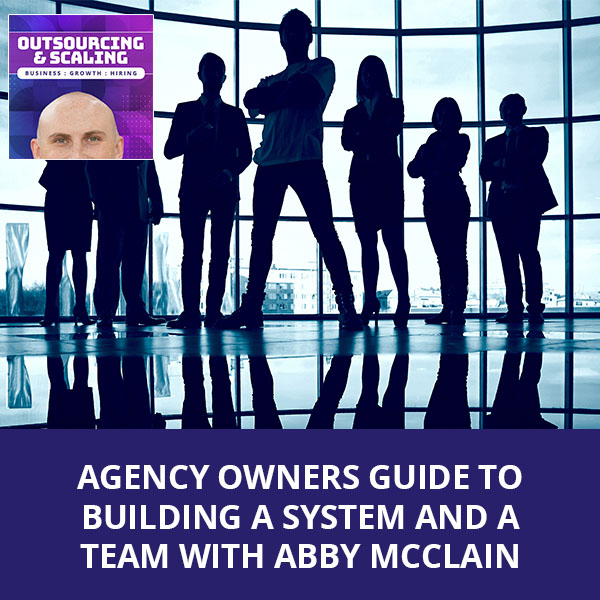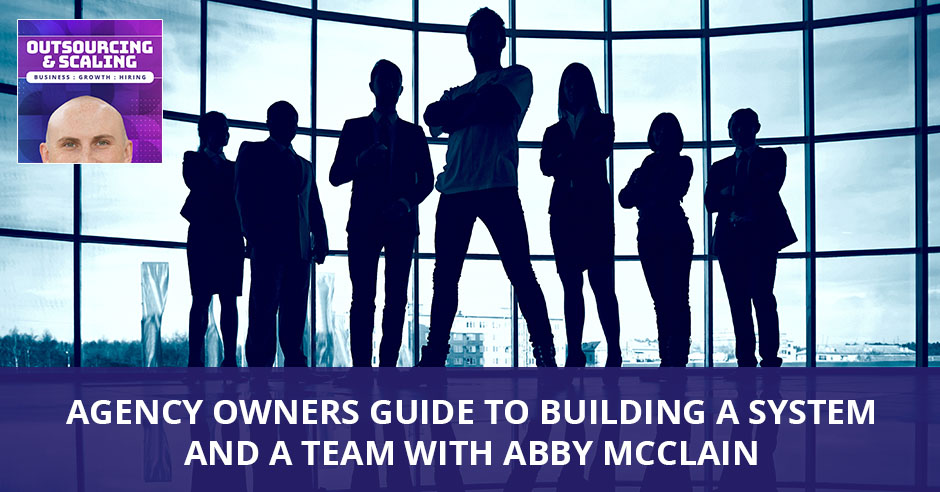


Building an agency isn’t just about doing all the work yourself. You have to build a system, a team, and a culture that will aid you throughout the entire processes. When it comes down to building an agency, agency owner and systems coach, Abby McClain, is about helping not just the agency, but the team that revolves around it as well. In this episode, Abby shares her knowledge and wisdom about the focus and time needed on a new start up agency. She dives deep into her story of transitioning to become an agency owner and gives out tips for those who are looking to do the same—from learning the ins and outs of working remote and keeping strong communications, to staying productive.
—
Listen to the podcast here:
[smart_track_player url=”https://www.podetize.com/statsapi/www.podetize.com/wp-content/uploads/fileuploads/11-5b145ef137b51b3d1af0633e9305c43d/12/2019/a5e019971677e60e61496a44fe0bcf67.mp3″ title=”Agency Owners Guide To Building A System And A Team With Abby McClain” artist=”Nathan Hirsch” image=”https://freeup.net/wp-content/uploads/2019/04/OAS.png” ]
Download the audio file here.
Agency Owners Guide To Building A System And A Team With Abby McClain
My guest is Abby McClain. Abby, how are you doing?
I’m doing awesome. How are you?
I am doing great. I’m excited to talk to you. I know you’re all about systems, process, team building, which is what I’m all about as well. It should be a great conversation. For those of you who don’t know Abby, she’s an agency owner, a systems coach and a full-time digital nomad. She helps overwhelmed and burnt out agency owners get their time in life back through systems and team building. She was telling me that she invested or started to focus her time on a new startup. We’re excited for her. We’ll talk about all that but first, let’s take a gigantic step back. What were you like growing up as a kid? Were you a straight-A student? Were you a rebel? Did you always know you wanted to be an entrepreneur?
When I was a kid, I was a goody two-shoe for a while. I followed the rules. I blamed that because I’m the youngest. I watched all my older siblings get in trouble for everything and I did not want to get in trouble. For a long time, I was a goody two-shoe and then college hit and I went crazy. I started bartending. After I started breaking the rules of society and seeing that there were other options, I literally dropped out of college on my very last semester. I have 120 credits and then I went into learning how to work online. I took tons of online classes, taught myself all these skills, started working for free, worked as an assistant and then I progressed and progressed over the years.
You’re learning all this stuff online. How does that transition into being an agency owner? There are a lot of people that go in that direction. They start working for another agency, they start freelancing, they start going into a different business endeavor. Why an agency?
Look for people who will take the initiative to do their hardest to figure out the problems themselves.
I got into the agency space almost by accident. I started out as a blogger and I was a part of these awesome masterminds. I was learning from some of the best bloggers online. I got some content published on places like Goalcast and it was super cool, but I realized that people weren’t generating a lot of money in blogs. I saw that there was this piece missing, that there was something missing. It was that marketing. There was no understanding of business structures and value-adders and how to pull that all together and make money from it. I started diving deep into that and then I got hooked on marketing. I started doing the whole freelancer thing and I wanted to be a digital nomad. I realized if I’m freelancing all the time, people were white labeling work to me and stuff like that. I saw that if I wanted to have the freedom that I want in my life, I couldn’t always act as a freelancer. I had to start being able to step away and bring other people in and build that bigger system that was bigger than me.
What did that look like? What did bringing other people onboard and not just do everything yourself look like?
It wasn’t great when I first started, that’s for sure. I didn’t have any idea what I was doing. I didn’t even know what SOPs were at the time. I was like, “I need this done. Help me do this.” I was bringing in other freelancers and then starting to find other agencies that I could white label work to like a big one that I could be like, “I’ll be the face of this.” I have other trusted agency owners who I know that I can have them do all the back-end work. That was the easiest way because they already have their systems in place. You just toss the work to them. Now I’ve come into this place where I like finding VAs or freelancers that I can hire. I don’t have anyone on full-time right now because I keep them in their specific zone of genius. If I have someone who’s a great graphic designer, I’m not going to ask them to come and do all this other stuff for me. What’s been important is keeping people where they perform the best. When you do that, you leverage the genius in each person and you see your business grow from that.
What do you look for in a hire?
I look for someone who’s definitely a self-starter, people who will take the initiative. I know it sounds weird, but some people will ask you many questions when they could do a quick Google search and find the answers themselves.

The ability to figure stuff out. It’s so key.
Granted your SOP should be good. Your person should understand the role and what you’re asking them to do. You need to make sure that your communication is good on the frontend. There are also little things where people will come and ask you questions and you’re like, “If you literally did a one-second Google search, you would have the answer to that.” That is why I look for people who will take the initiative to try their hardest to figure a problem and solve it themselves.
Do you have any bad hiring experience or any nightmare story that you could share?
I white labeled to an agency one time and it was not a super great set-up. The clients are not happy with the results. I was white labeling it, so I was confused at where to go because I had to take the responsibility for their lack of doing things correctly. I was trying to teach them how to do their job correctly and it was a mess. That’s pretty much the worst thing. Nothing too bad. I’ve had people come in where they say they’re going to do something and then they don’t do it. I usually would never outsource something if it desperately needs to be done the next day. Nothing too crazy.
Are you hiring more followers to follow your system and process? Are you hiring more specialists like people that are good at one thing that maybe you’re not good at? Are you hiring more experts or maybe white label partners to do things that you don’t do or you’re not good at? You don’t want to have a system for that, they already have that and they’re bringing it to the table.
Don’t spend all your days saying yes to everything. Learn how to say no and prioritize the times you’re in a great adventure.
I’m hiring more specialists. For the agency, there’s the backend ads and there’s the frontend, our ads and there’s the customer service. There are all these different pieces that you can break your system down into. I don’t want one person who was like, “I do your customer service, I do your cold calling, your cold emails and I set up your ads on the backend.” I’m like, “I don’t want that. I want you to be good at the thing that you do.” The whole goal would be to get many clients and ramp that up. Maybe when you first started, that person’s only working ten hours a week for you or something like that. Once you get more and more clients, now that person has a full-time position and they’re amazing at what they’re doing. Then you’re like, “This is your zone of genius. I want you to be the best at this.”
Your agency is completely remote.
I am pulling onto a new agency. I have two partners and we’re all completely remote. Pulling this agency together, which this project started for this new agency. The goal is to go from zero to $100,000 a month in less than six months. All staff are remote, everything.
Do you have any tips for working remote, keeping strong communication and staying productive? I am completely remote. I’m pretty good at staying focused, getting stuff done and communicating, but I think there are a lot of people that struggle with it. There are distractions. You’ve got the TV right there, you’ve got your refrigerator and then communicating with people in different parts of the world and different time zones and have other clients. Can you talk a little bit about that?
The big thing for me is finding an environment where I can get into an easy flow. If you’re going to be entirely remote, when you first start traveling, you might be bouncing around and backpacking and doing all these crazy things. You’re going on adventures all the time because you’re so excited to be traveling. The key is to say, “What does it take for me to have an easy life somewhere?” You have to have good Wi-Fi. You have to have a good work environment. You have to be able to get good sleep. You have to have access to healthy food. Stuff like that that’s going to keep you performing at a peak level because traveling is exhausting for your brain and body.

You need to make sure that you’re taking the right steps to still perform as an entrepreneur and be able to show up and limit yourself. Even though we all work for this freedom and we want to go out and do whatever we want, whenever we want. If you’re in the middle of a startup, if your systems aren’t built yet, if you’re still needing to put in those hours, don’t spend all these random days saying yes to everything when you’re traveling. You have to learn how to say no and prioritize that time and those adventures. A lot of time when I was in Colombia hanging out with a lot of entrepreneurs on there, the weekends, we’d do all the crazy stuff, but during the weekdays we’d go to coworking spaces and that would be our solution. As far as communicating, that is going to be different for everyone. You need to have a good team management or project management software where your whole staff is in there and the communication works for everyone. A lot of people are using Slack and you can even put a soft button that will tell you the time that every single team member is on. If I put like, “Meeting at 10:00 AM for me,” it will tell everyone what time on that is for them. That’s helpful with worldwide communication.
What tools do you use? You mentioned Slack. What other tools, software, any communication channels or project management stuff that you can share?
I am a huge systems nerd. I switch on all project management software with other management software because I like to be proficient across many platforms. That way, when I’m doing coaching for agency owners and I’m helping them build their systems, I need to be able to look at all this stuff they have going on and see like, “This system will work best for you.” I’m a fan of Asana and Monday.com. Those are my two go-to for everyone. You can organize and make a system out of these two tools for anyone and anything. It was cool. The team communication in there is very visual, nice and easy to lay out. It connects through Zapier to everything. Those would be my recommendations for people.
Can you describe the difference between Asana and Monday.com?
Asana is quite a bit more powerful. On Asana, you can do sub tasks, which can make the organization more layered. If you have one task and you look at it and you have all the sub tasks under there, sometimes that can make things a little bit easier and it’s a little bit more of a list view. Whereas Monday is in my mind idiot-proof. You could log on Monday.com right now and understand how it works. You might not know every single feature ever, but you would very easily be able to set up very visual systems that are easy for a team to see. You have a beautiful overview so you can see all the moving parts of everything that’s going on. That’s great if you have big projects, that you have the whole team working on one big project that’s a long-term project. It’s beautiful to come in there and look at it. I’m a huge visual person, so it’s great for me.
Every business is going to be different, but the fundamentals are pretty much the same.
You said that you’re all about systems, you’re all about processes. You work with other entrepreneurs. What are some common mistakes you see and what do you teach people to do that might be a better practice?
One of the biggest mistakes is usually the foundation of all my clients that come to me is that the business owner is bottle-necking their own agency. They’re still too involved. They haven’t stepped out enough, they haven’t built the systems to do that. The biggest systems that they’re generally messing up would be onboarding. A lot of times, the onboarding process is interesting. Maybe they’re not asking all the right questions. Maybe they’re not training their clients correctly, so they’re not giving their clients good boundaries of how to contact us. What channels can you contact us by? If there’s a problem, what do you do? Who do you talk to?
Even in agencies, there’s this thing where you bring them all these leads and then the client is like, “All these leads are crappy and nothing’s happening.” You’re like, “I brought you over 100 leads every month and you’re telling me all of them are bad? I know that’s not true because I know that if I call them, I’m going to turn something up.” There’s this disconnect happening. I’m like, “That’s because, first of all, you’re not training your client how to convert the leads. Second of all, you’re not training your staff to go the extra mile to help your client convert those leads.” There are still some weird areas in your system that you need to address because that’s going to kill your retention rate. Your turn rate is going to be very high. It is going to cost you a lot of money to keep calling on new clients, if at the end of your first contract, you’re losing your clients.
I teach my assistants like, “This is where you can Viber me at after hours. This is what a big issue is and this is what a small issue is. This is what the team leaders are for. If they can handle 95% of the stuff, you don’t have to come to me. If this one thing happens, don’t leave it for tomorrow. Make sure that you tell me.” Getting on the same page with what that extracurricular communication looks like is important and huge. When you’re dealing with someone that’s super disorganized and they’re all over the place, maybe they have a team of different people. How do you even begin to organize it? How do you break that down?
The first thing that I generally do with everyone that I work with, because for me, it’s not just about the business, it’s about the business owner. I have a personal connection with the people that I coach. I meet with them every week when they’re in my programs. It’s about them and their ideal life. Every person’s going to be different. Every business is going to be different, but the fundamentals are the same. That person, the business owner themselves, they have to go through a time audit, which means they have to understand what they’re actually doing throughout every hour of every day. That’s usually where I start people, because if they’re all over the place, they don’t know what’s broken, what’s working, “What am I doing? I’m working 60 to 80 hours a week, but I don’t see where all those hours are going or how this is working.”

Generally, there are two different ways. I have a task filter that I use in my program that’s like every hour, set a timer on your phone and then go into your task filter and write down every task that you did. Another good way that you can do this is using Toggl. It’s a time tracking app. A lot of times, it’s for staffing so that the staff can track their hours and what they’re working on. Freelancers can use it as well. You can use it for time tracking. If you stop and you eat for 30 minutes, you can go to Toggl and press start. Then when you’re done eating, press stop and be like, “I was eating lunch.” At the end of the week, you can go through it and be like, “I spent this much time sleeping, this much time eating, this much time working on proposals, this much time dealing with clients who were angry.” You get this good picture of what you’re doing. When we start there, then we can be like, “What can we delete? What can we automate? What can we delegate and start building out those systems for the business owner?”
What about team building? How does someone build that culture that’s efficient and productive?
When it’s remote, I definitely think it’s a bit harder. The team communication, when you start hiring, having conversations with those people, having the SOPs in place and building that culture is being a leader. You want to give your team everything that they can to win, to succeed and to have open lines of communication. Some people have this culture of wanting to micromanage everything and look over everyone’s shoulder. Make sure that people aren’t wasting their work hours or whatever because you’re paying them. You want to make sure it’s not wasted, but that culture breeds mistrust and some resentment. Empowering your staff and using the right language to empower them. I go through this in my program as well like the exact language of each different delegation level. If you want someone to make decisions for you or if you want someone to do research and then bring you the research. If you want someone to do research and then give you their best option and try to convince you on it. If you tell them yes, then they can go ahead and do it. There are many different layers and you can empower people by telling them, “This is exactly what I want you to do,” and many people will miss that.
People get so caught up in, “I want to use Time Doctor, watch their screens and make sure that every second is productive.” It breeds mistrust and makes people not want to work with you. They always feel you’re working over their shoulder. They’re not going to be as productive. They’re not going to be as creative. I have 50 VAs in the Philippines. I don’t have time to go through their screens. I build a certain level of trust and if they’re not doing what they should be doing, it’s not going to take me very long to figure it out. That little bit of money that I save is not worth that entire mentality that I’m pushing on them across the board. Would you agree?
Yes 100% because to be honest, a lot of times when we’re hiring VAs, we’re saving ourselves quite a bit of money by using VAs rather than having an office and staff come in and all this. The marginal money that you might lose if your staff watched a YouTube video for fifteen minutes rather than doing the work, it’s so small and marginal in comparison to having them be in a good mood, good attitude, want to be a part of the team, want to build your vision. That’s the big thing. It’s having people come in and care enough about your vision and where you’re trying to go. That culture of this isn’t just about money. It’s not just about me. This is the mission of my company. These are the changes we want to make in the world. Making it about something bigger makes it a big change.
There’s always ways to improve. So when you start working with your system, don’t just settle.
What else did I miss about building an agency, about systems, about team building?
I don’t know. That’s a hard one because I feel I see so much all the time. There can be many different avenues. The big thing that I want to warn people on is if one person is like, “I have this one system and it’s one shoe fits all business. This is 100% guaranteed that my system’s going to work for you.” You should be scared because everything is different, everyone is different, everyone’s goals are different, the company’s mission is different. Don’t believe just because everyone else is doing it one way, that that’s the only way. We’re entrepreneurs because we want to be innovative. There are always different ways to do things. There are always ways to improve. When you start working with your systems and stuff, don’t just settle because that one person told me that this is the right system. Use your brain, figure out your KPIs and start working towards those things.
Where can people find out more about you and what are you most excited about for the rest of the year?
I’m most excited about two things, but my coaching program. It’s in beta, so it’s super awesome. We’re doing a lot of testing. When someone joins a beta program, they have to do a happiness test. They do a stress test, they do a productivity test, they do a time audit on them. We’re taking all this data at the beginning of the program and then we have you repeat those tests at the end. Literally, this program we’re going to be able to say, “We saw a 30% decrease in stress over the course of this fall week program.” Everyone can check out what that’s all about. It’s at Bit.ly/WorkLessAndMakeMore. It’s a Google Document right now because it’s in beta. You can go through it and read what the program’s about. It’s for six-figure agency owners who are burnt out and overwhelmed. Other than that, until my website is up, everyone finds me on Facebook, have conversations with me on there. That’s pretty much it. I’m so packed-full right now, starting a hopefully seven-figure agency within the next few months. This beta program, which is my baby that I love and I love my clients that are in there. We have our little private group and we’re nerds on there.
Have a great rest of the day and we’ll be in touch.
Thank you so much.
Important Links:
- Abby McClain
- Slack
- Asana
- Monday.com
- Zapier
- Toggl
- Bit.ly/WorkLessAndMakeMore
- Facebook – Abby McClain
About Abby McClain
 Agency owner, a systems coach, and I’ve been full time digital nomad for the past year. I help overwhelmed and burnt out agency owners get their time and life back through systems and team building.
Agency owner, a systems coach, and I’ve been full time digital nomad for the past year. I help overwhelmed and burnt out agency owners get their time and life back through systems and team building.
